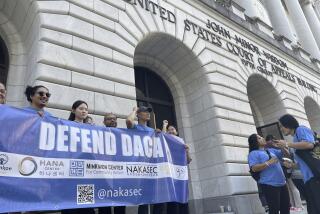High court hears key Medicaid case
Reporting from Washington — The Supreme Court justices opened their new term Monday by hearing a major healthcare case that tests whether judges can stop California and other cash-strapped states from cutting their payments to doctors and hospitals who serve low-income patients.
The case heard Monday will probably affect how much money is available to pay for medical care for more than 50 million Americans, about half of them children, who depend on Medicaid.
Since its creation in 1965, Medicaid has been a cooperative effort and jointly funded by the federal government and the states. But that cooperation is being tested as states face huge budget deficits. Over the last three years, the California Legislature voted a series of cuts, up to 10%, in its payments to providers of Medi-Cal.
The providers went to court in San Francisco arguing that California was violating federal law by imposing the cuts. They said the reduced payments were so low that patients would be denied the care they needed. In response, federal district and appeals court judges issued orders blocking the cuts from going into effect.
Lawyers for California, backed by other 31 states, appealed to the high court, and were joined by the Obama administration. Together, they argued that disputes over Medicaid funding should be resolved by healthcare administrators in Washington and Sacramento, not by judges in San Francisco.
The dispute “cries out for administrative review,” not an order from a judge blocking the state’s action, Karin Schwartz, a California deputy attorney general, told the justices.
Chief Justice John G. Roberts Jr. said he agreed with the state’s view, since Congress had not given private parties a right to sue under the Medicaid Act.
But Justices Ruth Bader Ginsburg and Elena Kagan spoke up for the medical providers who sued. They said California was seeking to cut its reimbursements even before the state had cleared the move with federal Medicaid officials in Washington. Ginsburg said there was no effective way to enforce the Medicaid Act if patients and providers could not go to court when spending was slashed.
“My people have a life-or-death problem,” said attorney Carter Phillips, arguing on behalf of the doctors and hospitals. He said judges must be permitted to act if the state violates the Medicaid Act by slashing payments.
The Obama administration’s stand surprised many healthcare advocates. In May, then-Acting Solicitor Gen. Neal Katyal took California’s side, telling the court that judges did not have the authority to intervene in the funding disputes. However, top lawyers of the Department of Health and Human Services did not sign his brief. Officials there believed judges were needed to block unwarranted funding cuts.
For their part, the justices sounded closely divided, but several of them showed interest in a middle-ground position. This view held that judges could issue temporary orders to block proposed state cutbacks, but only until Medicaid officials in Washington could review the proposed cuts.
The chief justice began the first session by noting the 25th anniversary of the day Justice Antonin Scalia took his seat and heard his first argument. “The place has never been the same since,” Roberts said to a smiling Scalia.
More to Read
Get the L.A. Times Politics newsletter
Deeply reported insights into legislation, politics and policy from Sacramento, Washington and beyond. In your inbox three times per week.
You may occasionally receive promotional content from the Los Angeles Times.











